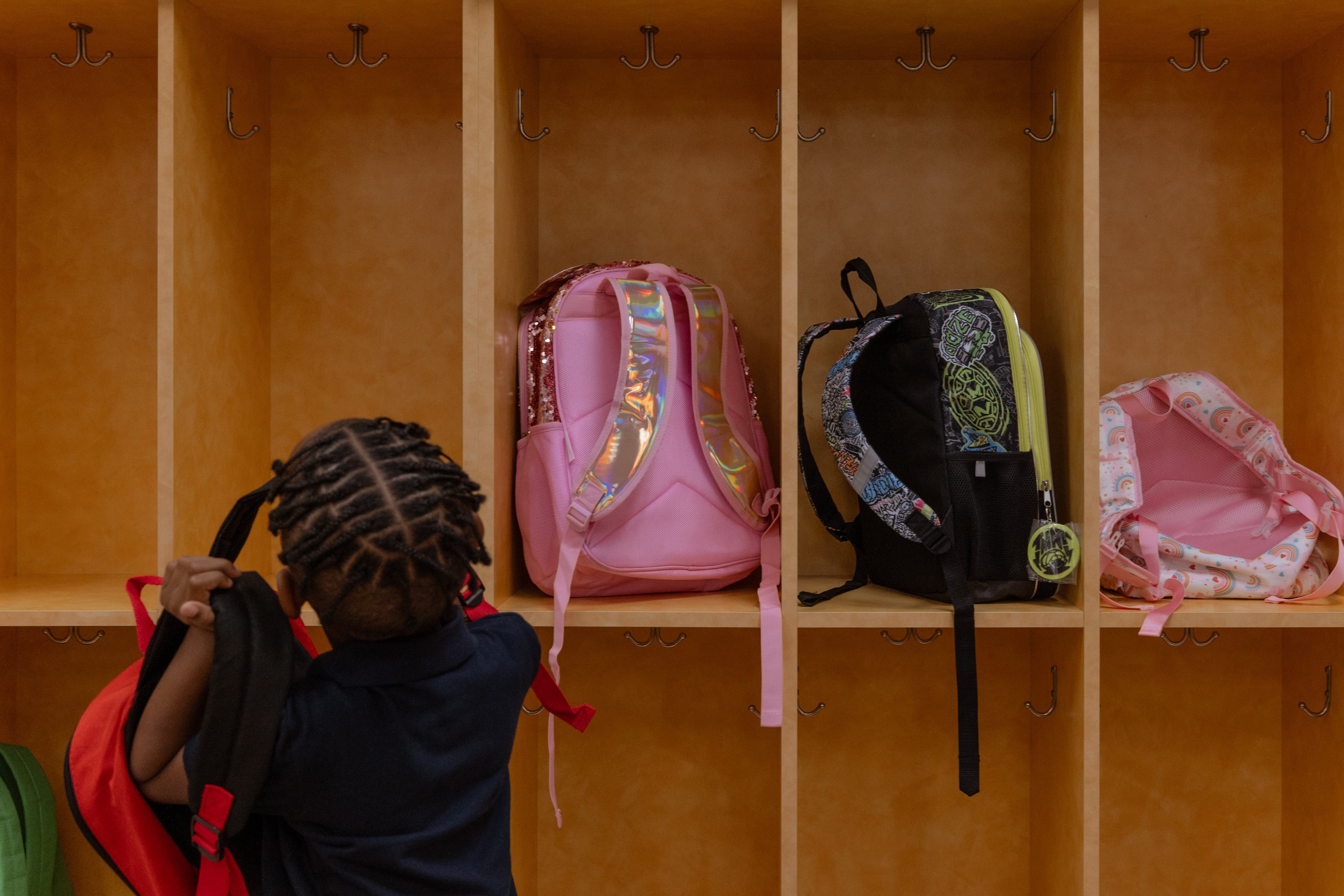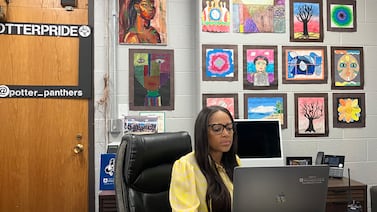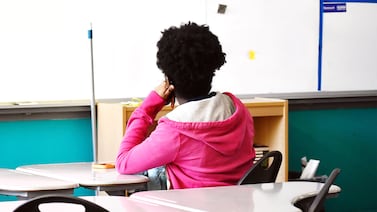Sign up for Chalkbeat Philadelphia’s free newsletter to keep up with the city’s public school system.
The Philadelphia school district has fallen way behind schedule in providing thousands of students in special education with extra services they did not receive during the pandemic, according to state officials.
The Pennsylvania Department of Education first directed the district to provide compensatory services to students in June after receiving a complaint from the Education Law Center on behalf of families.
According to the complaint, some parents and guardians were still unaware their children were entitled to extra help more than a year after students returned to in-person instruction. Families and advocates fear that many of these students may have suffered lasting damage.
“These are students who were most harmed by 15 to 18 months out of school,” said Margie Wakelin, senior attorney at the law center.
Wakelin said students didn’t receive the math tutoring, speech therapy, intensive phonics instruction, emotional support services, or other interventions that their education plans require.
In a review dated February 23 responding to the complaint, state officials found that the district has for the most part identified the students who need to be evaluated for compensatory services, but likely made decisions about what they were entitled to without properly consulting parents as required.
After analyzing 50 randomly chosen cases from four elementary schools in one of the district’s 16 learning networks, the state found only four in which the required meetings with families had occurred – yet the district made eligibility determinations in 44 of the cases.
“Not everybody is necessarily eligible, but meetings are supposed to happen to determine whether they are entitled to services,” Wakelin said.
The state ordered the district to submit evidence by April 5 that they have followed all the requirements for determining need and are providing appropriate services.
District says they face shortage of special education teachers
The closure of in-person school between March 2020 and September 2021 most severely affected students with disabilities who have either individualized education plans or 504 plans, according to the law center’s complaint. Individualized education plans, which are created by a team of school officials and parents, spell out services to which students are entitled, while 504 plans guarantee accommodations for students with conditions that could interfere with their learning.
The complaint relied on guidance from the U.S. Department of Education’s Office of Civil Rights on what districts must do to ensure that all children, regardless of disability, receive a “free and appropriate public education.”
The district received about $528 million in federal COVID relief funding, which was meant to help address learning loss, but budget materials for this fiscal year don’t mention compensatory services as a priority. District officials did estimate in one undated request for proposal that they would need to provide services to as many as 40% of the roughly 22,000 students with disabilities who were eligible. They expected to provide the services between January 2022 and June 2024.
In a statement issued Wednesday, district officials said that they are “working to remediate educational learning loss” from the pandemic, despite a “national shortage of qualified special education teachers and related service providers.” The district opened the school year with 200 teacher vacancies.
The statement also noted that Nathalie Nérée, who has experience in several other large districts including Chicago and Broward County, Florida, became chief of special education and diverse learners at the beginning of this school year.
Under her leadership, the district “is looking forward to building transparent, collaborative and positive relationships with our families, community partners and advocacy groups as we reimagine special education for students in Philadelphia.”
Families have found it difficult to get services
Many families in the school district have found the process to get compensatory services frustrating and have sought help from the Education Law Center.
Yolanda Workman said she and her daughter met with school officials in January on Zoom to discuss services for her grandson, a fifth grader at Emlen Elementary School in Mount Airy who has been diagnosed with a learning disability. The school’s special education liaison didn’t give them much of a chance to speak, she said, and then told them that the child was not entitled to extra services. The liaison also urged them to sign a legal document confirming that.
Workman said they refused to sign and told the liaison they planned to contact an attorney. A few weeks later, they received notice that her grandson was entitled to 75 hours of compensatory services.
But neither Workman nor her daughter could say whether he was receiving the services, or what form they were taking.
Colleen Gibbons-Brown, a special education teacher for ninth and 10th graders at Strawberry Mansion High School, said that she has not seen much evidence that students are getting extra services, or that parents and caregivers have been consulted about what students need and how best to provide it.
“From what I have seen, decisions are not made as a team, but by network case managers and some administrators,” she said. “They are making a call, then informing the parents, [thus] removing parents, teachers and even students from that decision.”
At her school, she said the process for deciding whether a student qualified for extra services was hasty and flawed. For instance, invitation letters for parents to meetings about their child were generated the same day that some of the meetings were scheduled. “I’m listed as being part of the team, and I know I wasn’t attending the meetings,” she said.
One of Gibbons-Brown’s colleagues, who is also the mother of a student with disabilities, said she had no idea that compensatory services were available, even though she works in the district. The child, now 10, had not learned to read and exhibited serious behavioral issues that were exacerbated during the pandemic.
“I never heard about compensatory services,” said the teacher, who asked not to be identified to protect her child’s privacy.
She contacted a lawyer, who helped her enroll her child in an approved private school, a common alternative for students whose education plans cannot be fulfilled within the district.
Wakelin said that the law center’s goal is to compel district officials to focus on alternatives to private services, which are expensive and tend to favor parents who are savvy in navigating the system.
Meeting this mandate also falls disproportionately on some public schools. For instance, at Strawberry Mansion, a neighborhood school in impoverished North Philadelphia, 43% of its 250 students are classified as needing special education. The citywide figure is 19%.
Determining services for students is complex
Calculating what is owed to each student and then providing services is a daunting task, Gibbons-Brown said. Still, she said her school’s process didn’t consider what progress students might have made if not for the pandemic’s disruption.
If a student had not regressed beyond what they had scored pre-COVID, it was decided they didn’t need services, she said. But that doesn’t take into account any progress they should have made since.
“Analyzing the impact of COVID is more nuanced than that quick comparison,” she said. “I have students, based on one data point now and for 2019, that may look like there is no regression. Maybe not, but their progress has stalled.”
Wakelin said the process is “now in the do-over period and we’re trying to get the word out to families so they know that their children have this right.”
As complex as the task is, “it’s not like there aren’t other large urban districts that have grappled with this and come up with solutions compliant with the law,” she said.
Wakelin said the district still has not taken basic steps to reach families, saying “there’s nothing on the website, no fact sheets for parents, and minimal information provided to teachers.
“We want kids to get services, not just a ruling that this child is eligible for 50 hours they are not able to use.”
Dale Mezzacappa is a senior writer for Chalkbeat Philadelphia, where she covers K-12 schools and early childhood education in Philadelphia. Contact Dale at dmezzacappa@chalkbeat.org.






